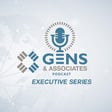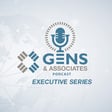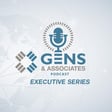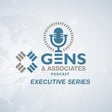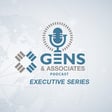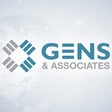Become a Creator today!Start creating today - Share your story with the world!
Start for free
00:00:00
00:00:01

AI/Automation Series #1 - Research highlights of our 2025 Regulatory Advanced Technology Survey (41 Companies, 17 Service Providers)
Kicking off this new series on AI/Automation, host Katherine Yang-Iott is joined by study leads Steve Gens and Greg Brolund. Together, they discuss industry / provider readiness for advanced technologies with a focus on AI. Hear about key study takeaways, changing sentiments in the AI era, and other considerations for your Regulatory organization.
Transcript
Introduction to the Podcast and Guests
00:00:00
Speaker
Hi everyone, and welcome to the Gens and Associates podcast. I'm your host, Katherine Young-Ayat, consultant and analyst with Gens and Associates. I have with me Steve Gens and Greg Roland on this episode where I'm going to be asking them to share with me and you the results of our latest study, which is the Regulatory Advanced Technology Pulse Survey.
00:00:20
Speaker
So before we get into all of the good stuff, Greg, Steve, hello, welcome. You know how we do this. I like for our audience to know who they are listening to. so Why don't you each give a quick intro, maybe say a little bit about your role in the survey or perhaps what your main interest was for doing
History and Evolution of AI in Regulatory Processes
00:00:38
Speaker
the research. So, Steve, why don't why don't you kick us off, please?
00:00:41
Speaker
ah Thanks, ah Catherine. And Steve Gens here, Managing Partner of Gens & Associates. And this study was number 46 in the other regulatory space. so you know Greg and I have, as you know, been doing these studies for about 18 years.
00:00:55
Speaker
Now, and, you know, the big hot topic is AI and automation. And I know we'll get into, you know, where we've tested some of those, you know, in our larger studies around this time last year and in previous years. But, you know, we definitely are in interesting times and in a shift, I believe, about, at least in regulatory, the viewpoints about the AI and automation benefits. And,
00:01:20
Speaker
You know, ah Greg, you you were the lead on this, but i' kind of advised and helped out where I can and, you know, trying to enroll the, yeah you know, companies and what was so unique about this. And we'll get into it later, I'm sure. It's just not an industry study. We had 41 companies in industry, but we had 17 software providers, a combination of kind of traditional platform, what we call transactional, you know, kind of software providers, then the niche ones that are in you know, generative AI, structured content authoring, and and a variety of other topics. So, yeah, looking forward to this today, you know, Catherine. So, Greg, over to you.
00:01:58
Speaker
Thanks, Steve. So, this is Greg Perl. And as Steve mentioned, I've been working with Steve and and various teams within Gens and Associates for... ah close to 20 years now, 18 or so years on these surveys and in consulting, especially around the technology that supports interactions with global health authorities.
00:02:20
Speaker
And I was particularly interested in the industry um plans and attitudes towards the use of advanced technology, in particular ah artificial intelligence, to achieve some of their regulatory goals in optimizing regulatory ah processes and activities.
00:02:45
Speaker
ah So that was our thinking going in as to what areas of interest were for advanced automation and regulatory. Great. Thank you so much. um So actually, why don't we start from the beginning? Steve, I'm going to start with you here because, you know, you are a really great storyteller and you probably know our audience the best and you've already started anyway. So can you give our listeners a really nice overview of the study? Right. What encouraged us to do this whole study now?
00:03:11
Speaker
What were we hoping to clarify or find? And I think our audience could benefit from hearing about the, you know, the key study takeaways here.
Study Goals: Industry Readiness and Data Quality
00:03:19
Speaker
Yeah, that's so that's a lot of questions there, Catherine. So, um I mean, Greg and I have been covering the technology and regulatory, yeah again, you know for 18 years. And there's been different turns you know where we have you know the enterprise content management in the early days.
00:03:37
Speaker
We're way ahead of the curve on, you know, global RIM programs. And there's always been in the last 20 years and in any function, some type of automation, but, you know, like different words like innovation, now artificial intelligence have really caught on fire. So like in our large world-class RIM study that we do every two years. So for our listeners, the last time we, uh,
00:04:00
Speaker
Did that was in April 2024. We have in the ah the section in the tech section, you know, what use cases for a variety of technologies, generative AI, structural content, authoring, natural language processing. We have like nine baskets of ah events, advanced technology.
00:04:18
Speaker
And we're asking like, yeah, what are your budgets? You know, cause like the budgets for gender and AI are about the same for data fabrics, data warehouses. So, but the focus, uh, is on, um, you know, AI and, you know, I'm a big believer in the Gartner hype curve. It's like, well, is this fitting like a glove and regulatory? So I think Greg and I were compelled to,
00:04:41
Speaker
Take it a step further. I mean, use cases and budget information is just basic information. And I know Greg will talk a little bit more about how we frame this from a readiness, um but you know, readiness from industry and the providers, you know, the the maturity, you And also we thought it would be really important and it was a great question about gauging sentiment.
Forecasting AI Adoption in Regulatory Processes
00:05:03
Speaker
um Because I think if we go back, ah you know, 18 months and just from a regulatory construct, ah there was probably a lot of fear and a lot of anxiety and a lot of organizations that there's going to be a lot of jobs lost versus, you know, today, I think it was around 76%, say CAI, as we've seen it in the last two years, as an assistant.
00:05:26
Speaker
It could be that writing assistant, you know version one, the machine does, and then the medical writer takes care of. um It could be a research assistant, so somebody that's doing a regulatory impact assessment, um where you know there can be a lot of efficiency. So we really wanted to explore it.
00:05:44
Speaker
um and try to separate what's practical versus all the hype. Because we know, and and this has fit, but in in our humble opinion, ah the yeah thought you know the hype curve from Gartner like a glove.
00:05:58
Speaker
And the other thing that we were in search for is we called it the implementation or deployment tipping point. So it's not when you know some of the companies that are really innovating in this space, when they've gone live in production, and there's many examples now,
00:06:13
Speaker
tons of proof of concepts. But if we think about industry as a bell curve, and it's a little bit different for large multinationals, mid-tier and small, about when is you know the tipping point?
Challenges in AI Adoption
00:06:24
Speaker
And if you read everything and believed it today, there's a lot of AI and different automation in production. And that is not the case. And we're forecasting based on the data, both from industry and the software providers, it's more 2016, 17,
00:06:40
Speaker
or 2026, sorry, in 2027. I was going to say you're going backwards here. Yeah, yeah. And because, you know, does it work or not like, you know, feature functionality that we've all been conditioned on, it's about reaching a degree of accuracy, especially with generative AI.
00:06:58
Speaker
ah Because i love telling the story of one organization, a leader, is we're going to AI everything and there's panic in the organization and probably overwork. And another organization is we're going to fully embrace AI over time because the I, the intelligence, is not too intelligent right now. So that's more of a pragmatic, hey, in two or three years, we're going to gauge the accuracy.
00:07:20
Speaker
And when's the appropriate time to go into full production? So even how we have to think about This type of technology is fundamentally different. And I know, Catherine, you and I in the OSEC, the change management forum, like what's the impact to change management practitioners, too, because it it is very different.
00:07:39
Speaker
So long winded answer, but more importantly, kind of curious what what Greg has to say. Well, agree with that ah pretty much completely, Steve. The only thing I will add just for the audience that we focused on regulatory.
00:07:53
Speaker
There are some questions that address company-wide governance and and and goals and so forth. But most of the questions around timeframe and what would be ah advantageous ah to implement in terms of advanced technology is around regulatory.
00:08:09
Speaker
So that you know keep that in mind as we talk about the results, because it's not talking about AI and discovery or some of the other areas that may in fact be more advanced.
00:08:20
Speaker
Yeah, that's a good detail to point out. um Greg, let me actually maybe you can kind of continue the conversation, but I i want to pick on something that Steve had mentioned earlier, right, what which is that the the main goal was really to explore this you know industry readiness, right, and see if it aligns with provider readiness.
00:08:36
Speaker
Can you just talk a little bit more about this, right? What do we mean by readiness and what did this study tell us about it? you know I'm imagining when you're answering this, if you could kind of paint a picture for the audience so that they could see like what the industry perspective looks like versus the providers or something like that.
Industry vs Provider Perspectives on AI Readiness
00:08:52
Speaker
Yeah. So mostly I'll talk about the industry. you know perspective on readiness and maturity in some ways. So we had a number of questions around that. But I'll give you the the the real cliff notes are that we found that industry is ready to begin using advanced automation, whether it's what we call standard automation, which includes things like robotic process automation and and some of the more traditional techniques of computer-assisted technology.
00:09:23
Speaker
you know processing um as well as artificial intelligence. the There are several survey questions that address the industry readiness to adopt advanced technology.
00:09:40
Speaker
The first relates to the activities industry plans to support through advanced automation for various regulatory activities. So we asked the question and and gave them, I think, nine or 10 different activities.
00:09:52
Speaker
Almost all the responses indicate a range of activities are supported today or will be supported by advanced automation within two years. So there's strong interest and activity in almost all of the regulatory activities that that we provided as examples, as use cases, if you will.
00:10:14
Speaker
And these include medical writing, submission quality and build, translations, automated translations, ah managing a regulatory lifecycle, managing labeling, health authority interactions, and It also includes regulatory impact assessments.
00:10:34
Speaker
And in fact, 73% of the participants in the survey indicate that they're implementing or have solutions in production today. So that's today plus in the near term within a couple of years.
00:10:48
Speaker
And Steve mentioned the sentiment question. One of the things that was a, we'll talk about a little bit later, maybe surprising, but it was a bit of a surprising takeaway that there's a generally positive opinion, and not so much fear of losing jobs and fear what it'll take and so forth, but a positive opinion of using AI in regulatory, again, specifically in regulatory.
00:11:12
Speaker
Also, there's some general agreement on what's needed within regulatory to maximize the volume ah of the value of AI. In this case, both industry and the providers themselves agree that high quality data is critical.
00:11:28
Speaker
So that's a readiness element. Not everyone says they have high quality, but at least there's agreement on what they need to do to be ready. Finally, industry has a clear view that advanced technology will be part of the regulatory production environment in the 2026 to 2027 timeframe.
00:11:49
Speaker
Steve talked about a bell curve, the peak of, not quite a bell curve, but the peak of activity from an industry point of view is that timeframe, next couple of years, which is actually in the very near future, in my opinion, given the pace of innovation in in regulatory systems.
00:12:09
Speaker
Just as a side note, the provider view of implementation timeframe varies. So we looked at traditional RIM providers, the platform providers, and they're more spread out. They think over 2025 through 2026 to and even the point solution or niche providers are very much counting on implementation within regulatory within the neck within this year, ah in the 2025 timeframe.
00:12:41
Speaker
So, you know, that may be a little bit optimistic, but I think that that gives you a good view of their particular business case. i think I think that's that's the overview of ah of readiness from both the industry and and providers' point of view.
00:12:57
Speaker
Great. Thanks so much, Greg. I mean, you you gave a lot of details there that I think that if I were someone listening to this without, you know, either I am from a company that didn't participate or perhaps I need to kind of like look at a graph or whatever to follow some of the things that you're saying.
00:13:12
Speaker
You know, we have a um results report on our on our website um if you're part of our membership, work which I can tell you a little bit more about later. But um you know to our listeners.
Incremental vs Revolutionary Changes with AI
00:13:23
Speaker
And I'll say a little bit more about this at the end of this episode, but this conversation that we're having here right now is actually going to be kicking off a series that we're recording focused around the topic of AI.
00:13:33
Speaker
And so, Greg, you made a lot of interesting points and perhaps one of those threads is worth pulling on in a subsequent episode for this series, especially about the changing sentiment. I think that's really interesting. But Anyways, um back to the study.
00:13:46
Speaker
um A question for either of you, and Greg, you kind of hinted at this, but you know what's surprising in our analysis or findings, right? We've been tracking advanced technology data points for, i would say, ah ah a decently long period of time. And for a while there, it didn't seem like the needle moved all that much in terms of like you know like a revolutionary new capabilities or these cool new use cases, widespread adoption.
00:14:09
Speaker
um But for me, you know and Steve, you mentioned this earlier, there This today feels a little bit different, right? There's a different kind of energy or action for AI and Gen AI. So um I don't know if either of you want to speak to this.
00:14:22
Speaker
Well, um I'll go ahead, ah Greg. I think it's my turn anyway, right? so well And I actually have one thing that was a little surprise, and um I know we explored it at the DIA RSIDM, but I'll ah probably introduce that and and see what you have to say for that. But, you know, ah to be truthful, Catherine, there wasn't much that was surprising because, you know, coming into this, we had a view that might not have been kind of the view you hear in the press or all the presentations. Because like at RSIDM in 2000 and, you know, 24, a year ago, just all the presentations were ai AI, AI, automation with not too much fact, you know, and practical reality.
00:15:07
Speaker
So as far as we've already talked about kind of the pace of change, the 26, 27 tipping point. So it kind of confirmed this, that, you know, and in my belief, it's a series of incremental changes, you know, many, many small changes over the course two, three, four, five years.
00:15:24
Speaker
So it kind of fits that continuous improvement, incremental, you know, change with automation. And there's been different flavors of automation over, you know, the past couple of decades. So think it really,
00:15:35
Speaker
kind of confirm truly what the pace is, which is a benefit for some companies that are struggling to educate that this is not going to happen overnight. ah Like Greg said, you know, everybody says, yeah, the data quality needs to be very you know high. Our top performers in our studies have high data quality because they have strong data governance and data management programs. So It also, even though it's AI and it's very different, having that strong you know data management, process maturity, having authoring standards um you know that really enable you know this kind of new generation of technology,
00:16:12
Speaker
And I know, Greg, it didn't come out from the survey, but when we were at RSIDM talking with many of the providers, there were some very insightful conversations. And we're actually exploring this with a ah kind of client we kicked off today about, is it structured content authoring?
00:16:28
Speaker
Is it generative AI? It's not either or or, but maybe the combination of that. I think that's going to be really, really you know interesting. um But I guess the one thing, one thing I took notice on and the one thing that was a surprise, and I don't think we have a clear answer to it, is our top performers that are in this study.
00:16:53
Speaker
um They had higher degree about just, you know, how much business benefit are we going to get at this point in time? And I think that's really important, Catherine, at this point in time.
00:17:04
Speaker
you know, is it just incremental benefits versus compelling? And what we're seeing is it's more incremental benefits, but maybe if you have multiple incremental but benefits, maybe it turns into something, you know, compelling and then it's very, very early, you know, days on this.
00:17:20
Speaker
But Greg, I think we're all gonna pass the baton to you. we were both, um I guess, big question marks where the provider side, those slides where we said, well, what's the business benefit and regulatory?
00:17:33
Speaker
And then ask the same question more generally on the enterprise. So comparing the perceptions of AI benefit enterprise versus just and regulatory. And then we had the provider view and the provider view was a lot higher as far as the anticipated benefits. like, do they know something industry doesn't?
00:17:52
Speaker
Is it marketing hype? You know, is it still too early with the experimentations? And I know you had talked with a bunch of the software providers and just kind of just generally ask them, you know, this, you know, it is a gap that providers see a lot more benefit opportunity than industry. So we thought that was,
00:18:10
Speaker
kind of interesting and really didn't know what to make of it. Yeah, so I have a cynical view on that. I think what they what we make of that is providers are trying to sell their software.
00:18:22
Speaker
So they they enhance their description of the benefits to the maximum extent, whereas industry... perhaps has a little bit more experience and in actual delivery of benefits or have been, you know, through the mill a couple of times. So, so that's, you know, maybe there's just a different view or maybe it's sort of driven by what business you're in.
00:18:44
Speaker
I will say the other surprise for me, and I think you alluded to it, was when we talk about the difference between industry and the providers of,
00:18:55
Speaker
in the area of what industry needs to have in place to maximize the value of AI. Earlier, I mentioned that everyone agrees on data quality, and that's both the providers and industry.
00:19:08
Speaker
However, the rest of them, I think we had nine other categories, and we asked, is it critical or sort of an important, i.e. nice to have?
00:19:20
Speaker
Except for data quality, industry, or I'm sorry, the providers don't have very high ratings in terms of a critical need in order to implement AI of but of many of the other other categories. They're in the low 20s, 30% of our providers believe that.
00:19:39
Speaker
So it's sort of an interesting difference. It could be that industry recognizes you need governance, you need change management, all those other aspects in order to get the data quality.
00:19:51
Speaker
And providers are really only interested in that you got to data quality. they don't care how you got there. But that was pretty interesting difference for me.
00:20:01
Speaker
So i have one last question. um You know, so i think think of it as a gift for our listeners, right? As as you guys know, or maybe perhaps you don't know, but I'm often the research lead in the studies that we do.
00:20:14
Speaker
And at the end of the day, what matters is the value of the information to the companies that either participated or the clients that are reading reports um that we have. Right. So, Steve, let me ask you, what's one of the gold nugget insights here?
00:20:28
Speaker
um You know, if we were to give a ah present to our audience, And we talked a lot about, you know, the study results and things that were surprising to us. But what's an insight that, you know, someone can take away with? Yeah, I think there's a few. it's it's called car It's kind of hard to limit it just to kind of one. So um i think kind of the three things that really, you know, from an insight and and with other work, we're doing client work, other studies and kind of putting that, all those ingredients into a salad bowl, kind of what what comes out that, you know, fundamentally that if you get past all the hype, you know, with this,
00:21:05
Speaker
it's going to be a series of incremental changes, both on the AI and automation, like automation example would be, you know, kind of robotics on that. And um unlike other waves of technology, a lot of the stage gate here is on accuracy, you know, and then there's conversations, you know, FDA, EMEA and others about validation in an AI environment. So there's a lot of different complexities But at the end of the day, it's a series of incremental change driven by thresholds of data accuracy. And, you know, most companies have ah a digital roadmap for regulatory for R&D and broader.
00:21:45
Speaker
And it's really, really important to set expectations with stakeholders and leaderships. you know, that this is a stage gate approach. It's incremental. It doesn't happen overnight.
00:21:56
Speaker
All the foundational stuff that we've talked about forever, data quality, data governance, process maturity, um you know, you'll get more benefit the stronger you are in those areas. So a series of incremental change. And I think it's been quite a while, maybe a decade or two that we've talked a lot about data sciences, data architects, data governance, data stewards.
00:22:18
Speaker
But you know that was very prevalent in the world-class RIM study about the acceleration upskilling and regulatory with a bunch of the data disciplines on that. um that Those are very, very big conversations and how do we accelerate that And finally, you know, we're starting to say publicly, if we think about the AI and automation and just apply it to regulatory and specifically regulatory operations, and this might be conservative that we believe by 2030. So that's, you know, four and a half years out.
Future Predictions and Strategic Planning for AI Automation
00:22:49
Speaker
that 30% of the RegOps tasks will be automated. So there'll be a shifting, um you know, of ah resources, some things phasing out, other new things like the data sciences, you know, going to whole new levels.
00:23:02
Speaker
um So regulatory can, you know, continue to be more strategic. so So that's kind of really, you know, for me, kind of the summary of kind of key points, key learnings or insights from the the study.
00:23:14
Speaker
So over to you, Greg. I agree completely in terms of the incremental approach, which I think is actually fairly wise. and The only other thing I'll add is that one of the questions we asked in the survey is whether they would use, they being industry, would use the advanced automation or standard automation or AI or a combination of of techniques and tools to support regulatory activities.
00:23:48
Speaker
And for the most part, it's a combination. There are very few things that are going to be ah looked at from ah pure AI or generative AI point of view. um there's There's combinations of things, and that speaks to the variety of activities within regulatory as well.
00:24:05
Speaker
But I think that's the other takeaway is ah both both paths, technology pathways, if you will, will be employed in an incremental way to achieve some of the benefits that are expected from advanced automation and regulatory.
00:24:22
Speaker
Great. Thank you guys so much. i mean, I think both of those things that you guys had mentioned are nice little pieces of insight for our listeners to to to take away with. So thanks for summarizing it. um Listeners, if you're your if your company is part of our membership, you can access all of our research reports. So not just this one, right? The one we're talking about today, which is the regulatory advanced technical survey.
00:24:42
Speaker
So lots of gold nuggets, lots of insight that you can kind of like kind of dig through. If you have questions or comments about anything that you've heard in this episode, you can reach out directly to Steve or Greg. um Their contact information should be available on the streaming platform that you're on um for more information about our membership.
00:24:59
Speaker
um Or if you want to contact us through that, you can just visit our Gens and Associates website. Greg, Steve, thanks so much again for chatting with me and our listeners. um Any sort of last remarks either of you want to get in before I close out?
00:25:11
Speaker
Yeah, none here. It pleasure being with all you guys. Thank you. Yeah, and ditto. I think we ah you know covered a lot of ground, and this is a topic that's ah you know and not not evolving you know yearly. It's evolving quarterly or even monthly.
Conclusion and Announcement of Future Series
00:25:26
Speaker
So...
00:25:27
Speaker
You know, I think everybody's scrambling to kind of keep on top of it. And, and you know, obviously we try to keep out a year or two ahead of everybody, which with this topic is actually very difficult. But da it's just fascinating times that we're ah living, you know, living in. I would compare this with so many different types of technologies over the last 30 or 40 years.
00:25:48
Speaker
kind of when this thing called the PC was brought out. And even in the early days, we didn't understand just like where we're at today with how it's fundamentally changed things and even smartphones. So I think this is one of those types of technologies that maybe looking five to seven years from now, as we look back in the beginning of 2025, that where will we be as regulatory community based on you know as a regulatory community based on you know, this very, very new cutting edge technology.
00:26:20
Speaker
Yeah, exciting times for sure. um i i mentioned this earlier that this episode kicks off a series that we're putting together where we're going to be having conversations focused around AI. And I know that we're planning on speaking with thought leaders, you know, research collaborators on the impact of AI on regulatory organizations, um strategically, organizationally, operationally, probably even mentally. So um You know, we'll have that series kicking off in the near future. And so you can look for those up next.
00:26:46
Speaker
um So thanks again, guys. Until next time. Cheers.


